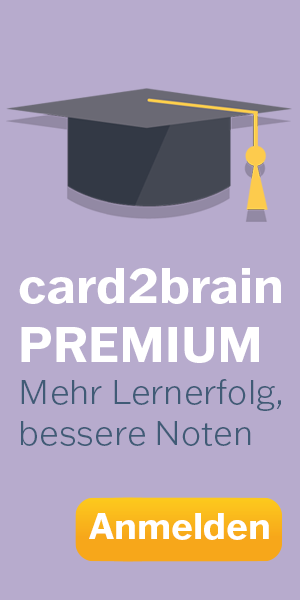Unit 5
Yves Wyss
Yves Wyss
Kartei Details
| Karten | 62 |
|---|---|
| Sprache | Deutsch |
| Kategorie | Englisch |
| Stufe | Andere |
| Erstellt / Aktualisiert | 10.03.2019 / 24.03.2019 |
| Weblink |
https://card2brain.ch/cards/20190310_unit_5
|
| Einbinden |
<iframe src="https://card2brain.ch/box/20190310_unit_5/embed" width="780" height="150" scrolling="no" frameborder="0"></iframe>
|
Grammar:
Can, could, might, may (ability and possibility)
To say someone has (or hasn't) an ability, we use can, can't, could and couldn't:
Francesca can speak five languages, but she can't speak Russian. As a child, she could play the piano but she couldn'd play the violin.
- The question forms are can you and could you: Can you swim? Could you run 20 kilometers when you were very young?
- We use can and could wit see, hear , smell, fell and taste: From the top of the mountain you could see for more than 50 km. I can hear a strange noise coming from upstaires.
To express possibility about the present future, we use may, might or could: I may come and visit you next summer. We might go to the cinema this evening if we finish all our work in time.we should go out for a walk now because it could rain later.
We use may not and might not for the negative (not can't or couldn't, which express certainty): Frankie is looking very pale: he may not be very well. Don't cook any dinner for me because I might not be back in time.
Grammar:
Should, should't, ought to, must, mustn't, have to, don't have to (obligation and prohibition)
To give somebody advice we use should or, less often, ought to: You should get a new pair of shoes. You ought to have a rest now.
- Particularly in the negative, shouldn't is more common than oughtn't: You shouldn't work so hard. The question form is should I / she, etc: Should we go now?
- We often use should (and occasionally ought to) to talk about the right thing to do, but which is different from what really happens: I should do the housework instead of watching television in the middle of teh afternoon. He should write his own answers instead of copying them from the internet.
To express obligation, we use must and have to: You must be quiet. I have to go now.
- We use must when the obligation is something we agree with. Teacher to students: You must hand in your homework on Monday.
- We use have to when the obligation comes from someone else: My teacher has given me a lot of homework which I have to do for Monday.
- We use must for strong advice: You must be careful if you stay out late at night.
- The question forms are must I / you, etc. and do I / you, etc. have to: Must we stop writing now? Do they have to wear uniforms at that school?
To express prohibition, we use mustn't: You mustn't go in there - it says No entry!. You mustn't speak during the exam - It's forbidden.
- Do not use don't have to to express prohibition: You mustn't use your mobile phone in class (it's not allowed). Compare this with: You don't have to use your mobile phone to speak to Fayed. Look! He is over there (i.e. it's not necessary)
- Never use mustn't about the past. For prohibition in the past, we can use not allowed to, e.g. We weren't allowed to speak. For something that wasn't necessary, we often use didn't have to: Jo gave me a ticket for the concert, so I didn't have to pay.
To say that there is no obligation, or it's not necessary, we use do't have to, don't need to or needn't: This is a really good exercise on phrasal verbs for anyone who's interested, but it's not for homework, so you don't have to do it if you don't want to. You needn't learn all the vocabulary on this page - only the words you think are useful.
Grammar:
Adjectives with -ed and -ing
There are many adjectives which can be formed with ed- or -ing
- Adjectives with -ed express how the person feels about something: She was terrified as Dracula approached her.
- Adjectives with -ing are used to describe the person or thing which produces the feeling: There's a surprising article in todays newspaper (I felt surprised when I read it).
- Common adjectives like this include:
amused /amusing; annoyed / annoying; disappointed / disappointing; bored / boring, relaxed / relaxing
surprised / surprising; tired / tiring; depressed / depressing; embarressed / embarressing
interested / interesting; amazed / amazing; excited / exciting; disgusted / disgusting; satisfied / satisfying
müde, überdrüssig
tired / tiring
adj. (more / most)
op. lively /fresh
wearied; exhausted; (with of) no longer interested in; bored with
She was too tired to continue
a tired child.
verblüffend
amazed / amazing
adj. ( more / most)
op. unsurprised / casual / bored
Nagoya Castle is an amazing sight.
aufgeregt, aufregend
excited / exciting
adj. (more / most)
op. bored / unexcited
an exciting adventure.
das Glück
happiness
noun (U)
die Eifersucht
jealousy
noun (U)
die Traurigkeit
sadness
noun (U)
traurig
sad
adj. (sadder / saddest)
op. happy / glad
unhappy or causing unhappiness
She’s sad because her son is ill
a sad face.
schreckerregend
frightening
adj. (more / most)
op. soothing (besänftigend)













